|
STEWARDSHIP SUNDAY (FOCUS ON RELATIONSHIPS)
Sunday, June 30, 2013
Writers for This Unit: Stacey M. Floyd-Thomas is a Lectionary Team Member. Guest Writer Michael R. Fisher, Jr. is a graduate student in the Graduate Department of Religion at Vanderbilt University, and serves as an associate minister at Covenant Baptist United Church of Christ in Washington, DC.
The unit you are viewing, Stewardship Sunday (with a focus on relationships), is a compact unit. This means that it does not have a supporting cultural resource unit and worship unit. Instead, to enliven the imagination of preachers and teachers, we have provided scriptural text(s) that we suggest for this moment on the calendar along with a sermonic outline, suggested links, books, articles, songs, and videos. For additional information, see Stewardship Sunday in the archives of the Lectionary from 2008–2012.
I. Description of the Liturgical Moment: Stewardship Sunday (Focus on Relationships)
Dale P. Andrews, Distinguished Professor of Homiletics, Social Justice, and Practical Theology at Vanderbilt Divinity School, wrote in the 2010 lectionary commentary for Stewardship Sunday:
Stewardship is a form of discipleship. It is a way of life, not simply an event. Church practices for Stewardship Sunday seek to cultivate an understanding of God’s gift of life and God’s gifts in our lives by nurturing lives of giving. Stewardship of our resources then is a form of thanksgiving and response to God. Hence, stewardship is a form of discipleship leading into this covenantal relationship.
The concept of stewardship as a tenet of discipleship is critically important for the Christian believer. Jesus called his disciples, and calls us, to follow his example of a life dedicated to giving—giving of one’s time, gifts, and resources—for the betterment of one’s community in service to God, and in thanksgiving for life.
At its core, stewardship centers on being in relationship with others. The first-century church understood this principle. They shared their resources as one mutual community. Jesus’ disciples in the early church recognized that relationship with each other was critical to exercising Godly stewardship as Jesus demonstrated by example. Stewardship Sunday is an opportunity to recognize the importance of the relationships we hold with one another, and how being in community has, from the founding of the Church, been an indispensable principle for followers of Jesus Christ.
II. Stewardship Sunday (Focus on Relationships): Sermonic Outline
A. Sermonic Focus Text: 1 Peter 4:8-11 (New Revised Standard Version)
(v. 8) Above all, maintain constant love for one another, for love covers a multitude of sins. (v. 9) Be hospitable to one another without complaining. (v. 10) Like good stewards of the manifold grace of God, serve one another with whatever gift each of you has received. (v. 11) Whoever speaks must do so as one speaking the very words of God; whoever serves must do so with the strength that God supplies, so that God may be glorified in all things through Jesus Christ. To him belong the glory and the power forever and ever. Amen.
B. Possible Titles
i. What Does Love Make You Do?
ii. A Charge to Keep: Serving God through Stewardship
iii. I Can Do All Things through Christ: Divine Strength to Serve
C. Point of Exegetical Inquiry
In any text, there are words, phrases, and concepts that require significant exegetical inquiry. One such inquiry raised by this text is what is meant by Peter when he says in verse 7, which is the backdrop (that the end of all things is near) for our text. “The end of all things is near; therefore be serious and discipline yourselves for the sake of your prayers.” What were the expectations among the leaders of the Church since they thought that the “end of all things was near”? And, does this change the fittingness and usefulness of Peter’s words for us today as stewards?
III. Introduction
This text explores the relationship between love, hospitality, and Christian stewardship. How does Christian reflection on the virtue of love inform ethical approaches to stewardship, and in what ways does it facilitate loving and hospitable relationships among individuals? One could also explore how stewardship can be characterized as a practice of servanthood. In other words, in what ways does responsible stewardship of our time, gifts, and financial resources reflect Christian service? Finally, the text suggests that God provides strength for the Christian believer to serve. Why is strength necessary to serve God and neighbor, and what are the implications of supernatural strength in practicing Christian stewardship in community?
The concept of community has always been a critical principle in traditional African culture. Our ancestors deeply valued the relational aspects of community life that stressed the importance of forward mobility as a collective. The African principle Ubuntu—I am because we are—emphasized the centrality of a philosophical devotion to the oneness of human beings. In the Christian community, such a philosophical ideal is rooted in the Christian virtue of love. The early Christian church also valued community.
Here in the fourth chapter of the First Letter of Peter, the author emphasizes the obligations and responsibilities of Christian life. He contends that above everything, Christian believers are to practice love and hospitality, ready to offer service for one another as good stewards of God’s grace. The author’s admonition underscores the importance of relationship within the Christian community. Love, hospitality, and service: the intersection of these three concepts provides valuable theological concepts that may expand the ways in which one understands Christian stewardship.
IV. Moves/Points
Move/Point One – Christian stewardship is love in action.
a. The text admonishes us to maintain constant love for one another.
b. Christian stewardship is motivated by Christian love.
c. We demonstrate our love by how we interact and treat one another.
Move/Point Two – Christian stewardship is a practice of servanthood.
a. Jesus provides the prime example of stewardship as service to God.
b. We serve God through God’s manifold grace.
c. Our God-given gifts are needed to practice Christian stewardship.
Move/Point Three – Christian stewards are strengthened by God to serve others.
a. We need to be continually strengthened by God in order to continually and successfully serve God and others.
b. Our source for divine strength is inexhaustible. Thus, even when we are weak, God makes us strong.
c. God provides us strength to serve so that God may be glorified.
V. Celebration
Jesus provided the prime example of what it means to be a good steward. He dedicated his life and ministry to serving God’s people for the purposes of enhancing their lives and teaching them how to be of service to others. Our faith teaches us that we are to love others, not only as we love ourselves, but also as Jesus loves us. That love covers a multitude of sins. Our love for one another is demonstrated through our service. Loving our neighbors indicates a willingness to use our God-given gifts in a faithful demonstration of Christian stewardship for a God who has called us out of darkness and into the marvelous light.
Because God gives us the strength to serve, we can be confident that we are equipped to emulate the example that Jesus set for us as we commit to using our time, talents, and resources to ensure that every one of God’s children is able to reach their fullest God-given potential.
VI. Illustration
The Great Reward of Earning $50 a Month
I learned a significant lesson during my brief tour as associate director of the Peace Corps. We set high standards for volunteers, but to our surprise we could have filled all of our available positions with volunteers from Los Angeles and New York alone. The finest college graduates in the country wanted a chance to engage in hard work on another continent in a developing country without modern conveniences among persons of another culture, sharing the local fare with mostly poor and illiterate people, for a salary of fifty dollars a month! They found the challenge so fulfilling that when their two-year tour ended, they had to be forced to return home. In this experience I saw many of Christ’s teachings fulfilled. When we give freely, we receive freely. When we seek to save our own lives, we lose them; but when we lose our lives for Christ’s sake, we truly find them.
| |
—Samuel Proctor in Proctor, Samuel, D., and Gardner C. Taylor,
We Have This Ministry: The Heart of the Pastor’s Vocation,
Valley Forge: Judson Press, 1996, p. 42. |
This illustration is taken from the Sermon Illustrations section of The African American Lectionary. See the Sermon Illustrations section of The African American Lectionary for additional illustrations that you may wish to use in presenting a sermon for this moment in the liturgical calendar.
VII. Sights, Sounds, Emotions, and Colors in This Passage
| Sights: |
A community living as if they believe the end of the world is near; faces of people who love one another; acts of love such as those with little sharing with those who have less; people being hospitable to one another without complaining; people serving one another through a variety of physical acts; people serving one another even when it is difficult to do so;
|
| Sounds: |
People speaking as if they are speaking the “very words of God”; people talking to one another to find out if a believer is in need or how they are feeling; people giving words of thanks for their neighbors and praise to God;
|
| Emotions: |
Joy; some are subdued, some are serious since the end of all things is near; celebratory by some since they believe that they will soon be taken up to God; and
|
| Colors: |
Gray houses; brown wooden tables; cloth used for head coverings and to cover tables; green grass surrounding houses; the color of freshly baked bread; and the colors of territory (area) in which these believers lived. |
VIII. Songs to Accompany This Sermon
A. Well-known Song(s)
- What Shall I Render? By Darius Brooks and Margaret J. Douroux
- This Little Light of Mine. Traditional
- What Would You Do? By Shirley Caesar, Jeff Krassner, Michael E. Mathis, Bernard Sterling, and Dottie Sterling
B. Modern Song(s) (Written between 2005–2012)
- I Need You to Survive. By David Frazier
- My Life, My Love, My All. By Kirk Franklin
- Praying for You. By William Murphy and Larry Nix
C. Spiritual(s)
- You Can’t Beat God Giving. Text and Tune by Doris Akers. Arr. by Evelyn Simpson-Curenton
- Come, Come! Ev’rybody Come! By Marilyn E. Thornton
- I Am on the Battlefield for My Lord. By T. V Banks. Arr. by Joseph Joubert
- If I Can Help Somebody. Words and Music by A. Bazel Androzzo. Arr. by Kenneth Morris
D. Liturgical Dance Music
- Soldier On. By Kurt Carr
- Go Get It. By Erica Campbell, Tina Campbell, and Warryn Campbell
E. Song(s) for the Period of Prayer
- I Look Like You (When I Worship). By Keith Cistrunk, Israel Houghton, Aaron W. Lindsey, and Hart Ramsey
- Perfect Peace. By Rudolph Stanfield
F. Sermonic Selection(s)
- Use Me Lord. By James Cleveland
- Thy Will Be Done. Traditional
G. Benediction Song(s)
- Didn’t You Know. By Donnie McClurkin
- Releasing My Faith. By Charles Jenkins
IX. Videos, Audio, and/or Interactive Media
X. Books to Assist in Preparing Sermons, Bible Studies, and/or Worship Services Related to Stewardship
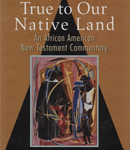 |
Powery, Emerson B., and Brian K. Blount. “2 Timothy” in True to Our Native Land: An African American New Testament Commentary. Minneapolis, MN: Fortress Press, 2007. |
|
|
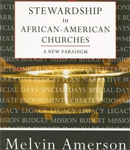 |
Amerson, Melvin. Stewardship in African-American Churches: A New Paradigm. Nashville, TN: Discipleship Resources, 2006. |
|
|
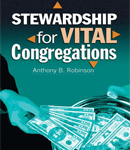 |
Robinson, Anthony B. Stewardship for Vital Congregations. Cleveland, OH: Pilgrim Press, 2011. |
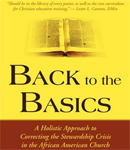 |
Banks, Jr., George W. Back to the Basics: A Holistic Approach to Correcting the Stewardship Crisis in the African American Church. Tucson, AZ: Wheatmark, 2008. |
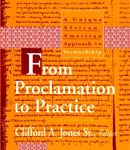 |
Jones, Clifford A. From Proclamation to Practice: A Unique African American Approach to Stewardship. Valley Forge, PA: Judson Press, 1993. |
XI. Notes for Select Songs
A. Well-known Song(s)
- What Shall I Render? By Darius Brooks and Margaret J. Douroux
Location:
The Mississippi Mass Choir. God Gets the Glory. Jackson, MS: Malaco, 1991.
- This Little Light of Mine. Traditional
Location:
Franklin, Aretha. Divas of Gospel: Reach for the Heavens. Los Angeles, CA: Fuel 2000, 2007.
- What Would You Do? By Shirley Caesar, Jeff Krassner, Michael E. Mathis, Bernard Sterling, and Dottie Sterling
Location:
Caesar, Shirley. I Remember Mama. New York, NY: Sony, 1992.
B. Modern Song(s) (Written between 2005–2012)
- I Need You to Survive. By David Frazier
Location:
Walker, Hezekiah & The Love Fellowship Crusade Choir. Praise Your Way Out: Songs of Inspiration and Hope. New York, NY: Verity, 2009.
- My Life, My Love, My All. By Kirk Franklin
Location:
Franklin, Kirk. Setlist: The Very Best of Kirk Franklin Live. Inglewood, CA: Gospocentric, 2011.
- Praying for You. By William Murphy and Larry Nix
Location:
Murphy, William. God Chaser. New York, NY: Verity, 2013.
C. Spiritual(s)
- You Can’t Beat God Giving. Text and Tune by Doris Akers. Arr. by Evelyn Simpson-Curenton
Location:
African American Heritage Hymnal. Chicago, IL: GIA Publications, 2001. #671
- Come, Come! Ev’rybody Come! By Marilyn E. Thornton
Location:
Zion Still Sings for Every Generation. Nashville, TN: Abingdon Press, 2007. #142
- I Am on the Battlefield for My Lord. By T. V Banks. Arr. by Joseph Joubert
Location:
African American Heritage Hymnal. #480
- If I Can Help Somebody. Words and Music by A. Bazel Androzzo. Arr. by Kenneth Morris
Location:
Zion Still Sings. #140
D. Liturgical Dance Music
- Soldier On. By Kurt Carr
Location:
Carr, Kurt & The Kurt Carr Singers. Bless This House. New York, NY: Verity, 2013.
- Go Get It. By Erica Campbell, Tina Campbell, and Warryn Campbell
Location:
Mary, Mary. Go Get It. New York, NY: Columbia, 2012.
E. Song(s) for the Period of Prayer
- I Look Like You (When I Worship). By Keith Cistrunk, Israel Houghton, Aaron W. Lindsey, and Hart Ramsey
Location:
Ramsey, Hart. Next Now! New York, NY: Entertainment One Music, 2013.
- Perfect Peace. By Rudolph Stanfield
Location:
Pugh, Earnest. Perfect Peace. New York, NY: Worldwide Music, 2012.
F. Sermonic Selection(s)
- Use Me Lord. By James Cleveland
Location:
I Don’t Feel Noways Tired. Jackson, MS: 601 Music, 1990.
- Thy Will Be Done. Traditional
Location:
Jackson, Mahalia. In Concert Easter Sunday, 1967. New York, NY: Legacy, 1967.
G. Benediction Song(s)
- Didn’t You Know. By Donnie McClurkin
Location:
Live in London and More…. New York, NY: Verity, 2000.
- Releasing My Faith. By Charles Jenkins
Location:
Jenkins, Charles & Fellowship Chicago. The Best of Both Worlds. Brentwood, TN: Inspired People, 2012.
|